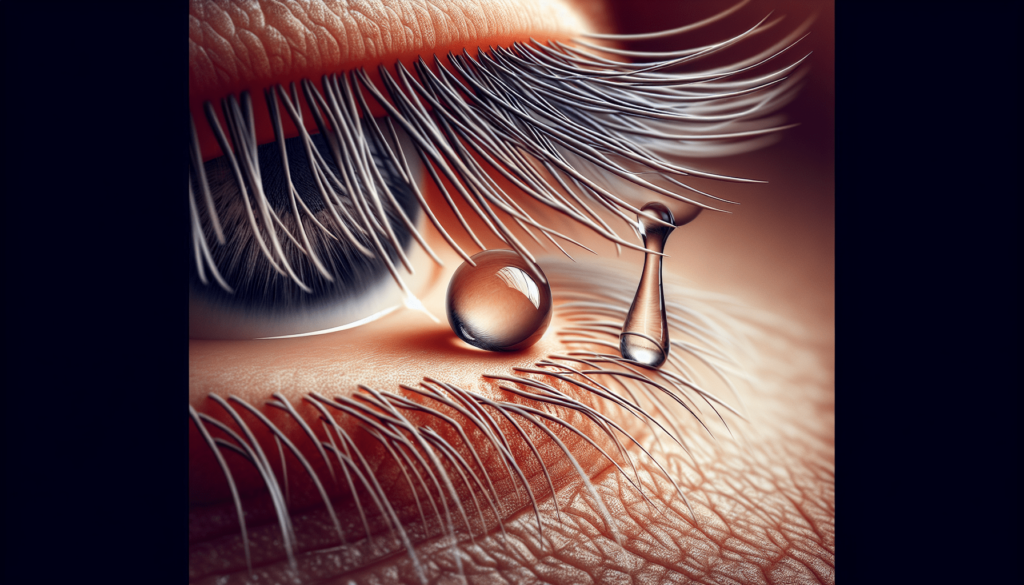Hey there! Have you ever wondered if dry eye could actually cause you to experience excessive tearing? It may seem counterintuitive at first, but in reality, the two conditions can be closely connected. When your eyes are dry, they can actually overcompensate by producing too many tears in an attempt to lubricate and protect the surface of the eye. If you find yourself constantly dealing with dryness and tearing in your eyes, it may be worth exploring the possibility of dry eye syndrome as the underlying cause. Don’t worry though, there are plenty of treatment options available to help you find relief and restore comfort to your eyes.
Can Dry Eye Lead To Excessive Tearing?
Have you ever experienced the discomfort of dry, irritated eyes, only to find yourself tearing up excessively shortly afterward? You may be wondering if dry eye can actually lead to excessive tearing. Let’s dive into this common eye health issue and explore the connection between dry eye and excessive tearing.
Understanding Dry Eye Syndrome
Dry eye syndrome is a condition in which your eyes do not produce enough tears or the tears evaporate too quickly. This can lead to a range of uncomfortable symptoms, including itching, burning, redness, and a feeling of grittiness in the eyes.
If you frequently experience these symptoms, you may have dry eye syndrome. It’s important to consult with an eye care professional for a proper diagnosis and treatment plan.
The Causes of Dry Eye
There are several factors that can contribute to the development of dry eye syndrome. Some common causes include:
- Aging: As we age, our tear production tends to decrease, leading to a higher risk of dry eye.
- Environmental factors: Exposure to smoke, wind, dry air, or air conditioning can exacerbate dry eye symptoms.
- Medical conditions: Certain medical conditions such as diabetes, rheumatoid arthritis, or thyroid disorders can increase the risk of dry eye.
- Medications: Some medications, such as antihistamines, decongestants, and antidepressants, can cause or worsen dry eye symptoms.
It’s important to identify and address the underlying cause of your dry eye in order to effectively manage the condition.
The Symptoms of Excessive Tearing
Excessive tearing, also known as epiphora, is a common symptom of several eye conditions, including dry eye syndrome. Some signs that you may be experiencing excessive tearing include:
- Watery eyes: Constant tearing that leads to a watery appearance of the eyes.
- Blurred vision: Excessive tearing can cause blurred vision, making it difficult to see clearly.
- Irritation: The excess tears may irritate the skin around your eyes, leading to redness and discomfort.
If you are experiencing these symptoms, it’s important to consult with an eye care professional to determine the underlying cause of your excessive tearing.
The Connection Between Dry Eye and Excessive Tearing
While it may seem counterintuitive, dry eye syndrome can actually lead to excessive tearing. When your eyes are dry, they may become irritated and inflamed, causing your body to produce an excessive amount of tears in an attempt to lubricate and protect the eyes.
These excessive tears, however, may not contain the right balance of oils, mucin, and water needed to keep the eyes properly lubricated. As a result, you may experience a cycle of dryness followed by excessive tearing, leading to a frustrating and uncomfortable situation.
Treating Dry Eye to Reduce Excessive Tearing
Fortunately, there are several ways to manage dry eye syndrome and reduce excessive tearing. Some treatment options include:
- Artificial tears: Using over-the-counter artificial tears can help lubricate the eyes and reduce dryness.
- Prescription eye drops: In some cases, your eye care professional may prescribe medicated eye drops to help manage dry eye symptoms.
- Warm compresses: Applying a warm compress to your eyes can help stimulate tear production and relieve dryness.
- Lifestyle changes: Making changes to your environment, such as using a humidifier or avoiding smoke, can help reduce dry eye symptoms.
By following your eye care professional’s recommendations and staying consistent with your treatment plan, you can effectively manage dry eye syndrome and reduce excessive tearing.
Preventing Dry Eye and Excessive Tearing
In addition to treating dry eye symptoms, there are steps you can take to prevent the condition from worsening and reduce your risk of excessive tearing. Some tips for preventing dry eye include:
- Stay hydrated: Drinking plenty of water can help keep your body, including your eyes, properly hydrated.
- Take breaks: If you spend long periods of time looking at screens, take frequent breaks to rest your eyes and reduce strain.
- Protect your eyes: Wear sunglasses or protective eyewear when outdoors to shield your eyes from wind, dust, and other irritants.
- Follow a balanced diet: Eating foods rich in omega-3 fatty acids, such as salmon or flaxseeds, can help support eye health and reduce dryness.
By incorporating these preventative measures into your daily routine, you can help maintain healthy eyes and reduce your risk of developing dry eye and excessive tearing.
When to See an Eye Care Professional
If you are experiencing symptoms of dry eye or excessive tearing, it’s important to schedule an appointment with an eye care professional for a proper evaluation and diagnosis. They can help determine the underlying cause of your symptoms and recommend an appropriate treatment plan to relieve your discomfort and improve your eye health.
Don’t ignore the signs of dry eye or excessive tearing. By seeking prompt medical attention and following your eye care professional’s recommendations, you can effectively manage these conditions and enjoy clear, comfortable vision.
In conclusion, while dry eye syndrome can lead to excessive tearing, there are effective treatment options available to help you manage these symptoms and improve your eye health. By understanding the connection between dry eye and excessive tearing and taking proactive steps to prevent and treat these conditions, you can enjoy clear, comfortable vision for years to come.

